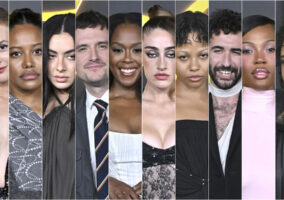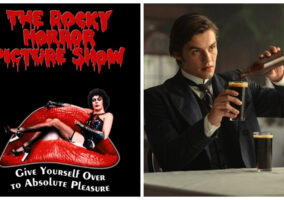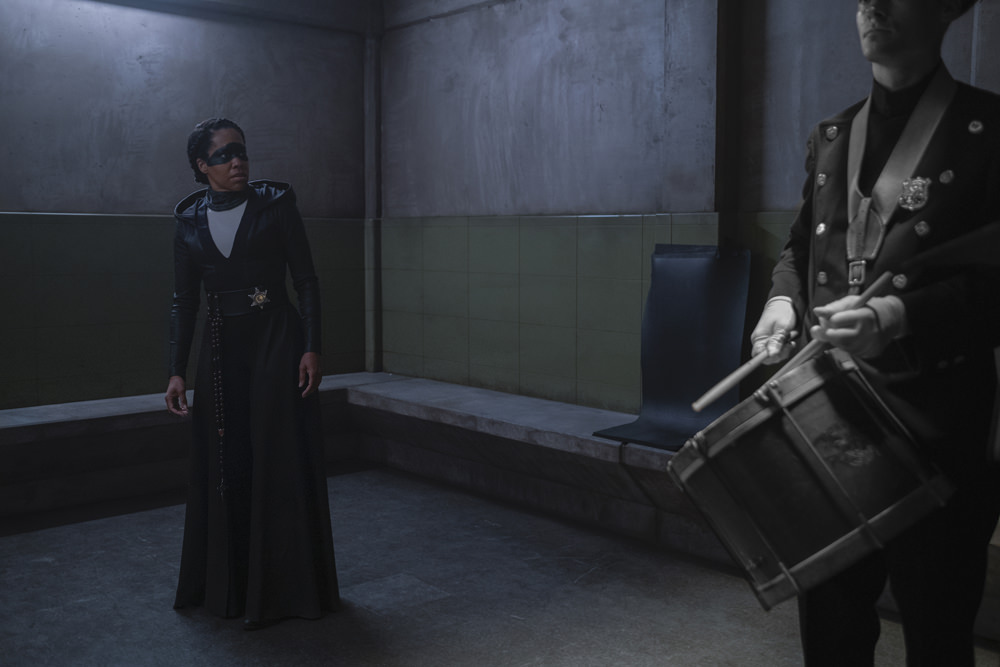
We haven’t checked yet, but are the fanboys enraged this morning?
See, last month, when we watched the screener for this episode, in which one of the more iconic (if largely undefined) figures of the Watchmen “universe” (for lack of a better term) was retconned to be a black man with a lifelong mission of fighting white supremacists, Tom turned to Lorenzo and uttered the kind of phrase only an experienced writer and cultural critic could truly envision:
“Oh, holy shit.”
Yes, his schooling and experience really helped him out there. Tom’s point: The last twenty years of comicbook nerditry has seen the rise of the angry fanboy. As superhero stories went from derided niche market to worldwide cultural phenomenon (thanks entirely to the Marvel films), a small but intense portion of the male comicbook fan community, used to being the butt of jokes for liking kids’ books, found itself angrily defending their beloved hobby from people they didn’t think had earned the right to partake of it. There was a lot of attempted gatekeeping in the early years of this century, fueled partly by the rise of the genre’s popularity in the general public, and partially by the perception of some ardent fans that the “wrong kind of people” were now claiming to be superhero fans. And, this century being what it is, these lines – for some – tended to break down according to gender, race, and sexual orientation. This is why female comics creators are so harassed online. This is why every time a movie or film adaptation of a superhero casts someone not of the race or gender that hero is traditionally depicted, you’ll come across intense fan rage and organized fan boycotts of the material. Think of the responses to the Ghostbusters reboot (which drove star Leslie Jones off twitter), the diversity of the most recent Star Wars trilogy (which drove star Kelly Marie Tran off social media) or the attempted boycott of the Captain Marvel movie because star Brie Larson advocated centering the voices of critics who weren’t white men. Given this atmosphere – not to mention the last few years in this country, what with all the Nazis marching and stuff – for writers Damon Lindelof and Cord Jefferson to even attempt this story was a move of shocking boldness on their parts. That they (and episode director Stephen Williams) managed to turn it into one of the best, most exciting and visually interesting episodes of television in the past year is an amazing feat.
And if you think we’re overthinking things by connecting Hooded Justice’s race retcon to the last few decades of fanboy rage against the evolution of their childhood fantasies, we will note with some satisfaction that the theme of this episode – stated outright several times and then demonstrated repeatedly for the entire length of the hour – is this:
Nostalgia is toxic.
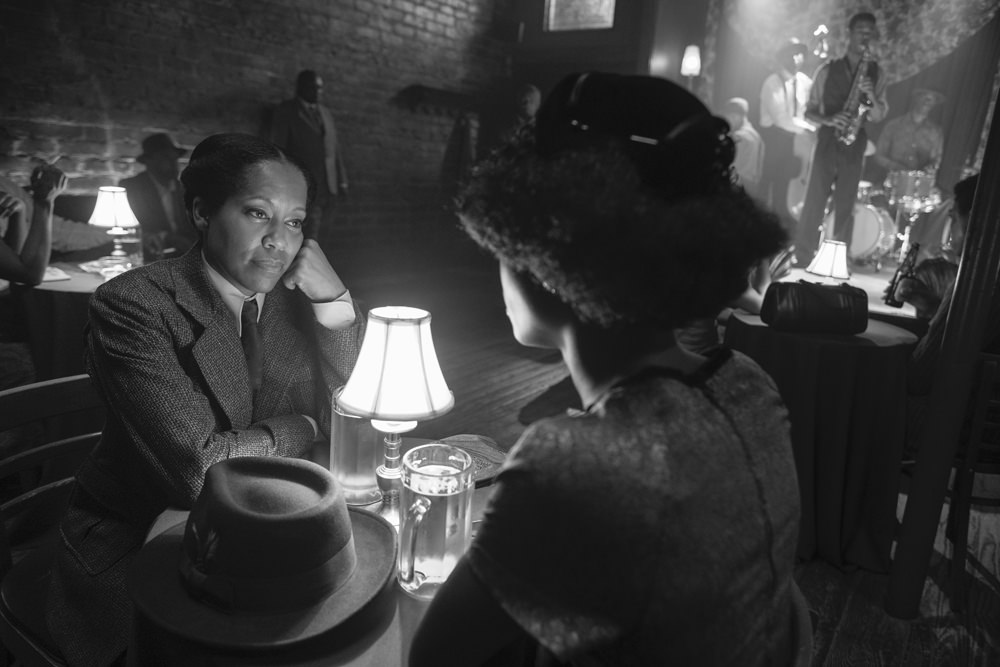
But the brilliance of this episode is how it works on so many levels at once. While there’s a rebuke to fanboy culture inherent in the story, it’s overwhelmingly a tale of rage, racism and genetic trauma. A journey by a rootless woman traveling so deep into her own roots that she may never find her way out again. A series of revelations that threaten to strip of her own individuality even as it educates her on who she actually is.
Angela, her back against the wall and desperate for some answers, swallowed the entire bottle of her grandfather’s memories. Given the Nostalgia pill’s toxic history, we weren’t entirely sure why she’d do such a thing. Laurie was certainly taken aback by it. Notice how confused she seems while trying to reach Angela through the fog of the drug. But we think Angela’s actions make more sense when you consider how much this show has been about racist trauma and the long-term effects it has on a family through the generations. Will’s life is full of intense physical and emotional pain; a relentless, lifelong pummeling and pounding of racism punctuated by events of extreme violence, perpetrated on him or by him. This episode made manifest that which has been treated as mostly metaphorical in the real world: Centuries of racism and racist violence echo down the generations of African-American families, having effects that we as white people couldn’t begin to elucidate or explain. It remains to be seen how this event will affect Angela personally, but we suspect she’s gained as much of an understanding of herself as she now has of her grandfather. We know her parents died when she was young and she’s had no family-of-origin contact or information. We know she grew up surrounded by very few black people in an Asian culture and wound up becoming mother to a trio of white children. As a black female officer of the law in Tulsa, Angela is extremely knowledgeable about racism and white supremacy, but we don’t think she’s ever understood the long reach into her own family – and how much it has affected her personally – until she almost literally walked in the shoes of her ancestors. She’s an officer of the law who puts on a hood and paints her face in order to hide her identity, not just echoing her grandfather’s life, but copying it directly without ever knowing she was doing so.
Will’s origin had already made deep allusions to the Superman origin in the first episode, as his parents loaded him into a cart to take him far away from a community on the brink of total devastation. This is now more poignant and notable than ever with the revelation that, like Superman, Hooded Justice was the very first superhero in his world, a fact underlined by the short interlude about Action Comics #1. Which reminds us: there was absolutely nothing subtle (“Nostalgia is toxic”) about the images or metaphors here. We think that was by design. This was meant to be blunt, obvious, and visually stunning all at once. Exactly like a superhero comic. Again, making the point in an extremely obvious but nonetheless dazzling fashion: the shot of Angela, in Hooded Justice’s costume, suspended in mid-air among shards of glass as she explodes through a plate glass window. That’s as close as any filmed scene has ever come to replicating the experience of comic artwork without the use of animation.
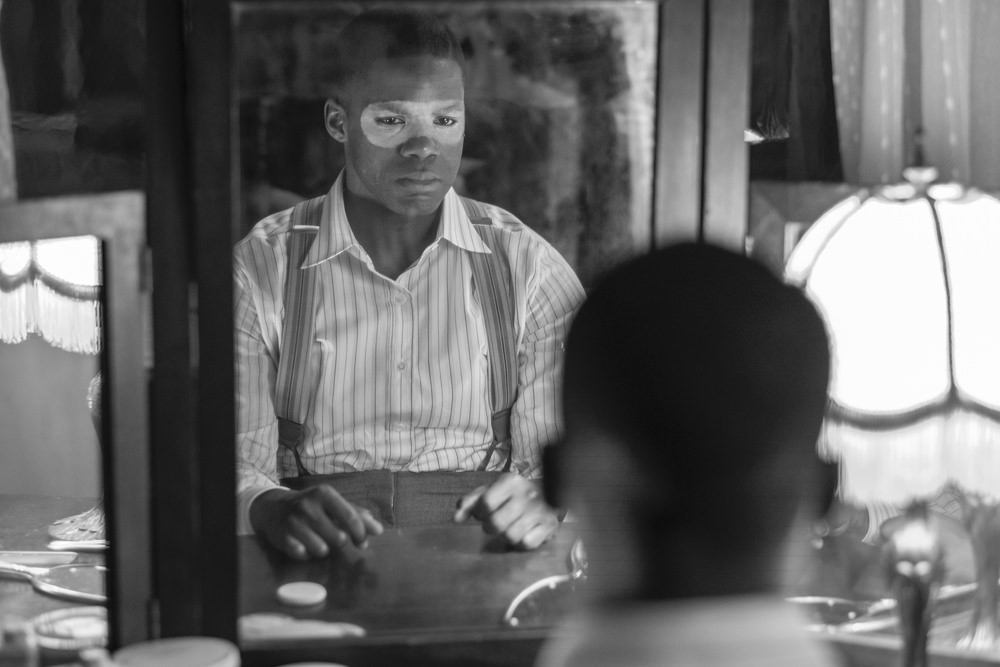
There are also, we see, allusions to Batman (Will’s parents are killed after leaving a theater and Will himself stops a mugging that calls to mind the murder of the Waynes) and the Lone Ranger (Bass Reeves, who inspired Will and whose inspiration is underlined constantly by the eerie appearances of his mother playing his theme, is considered the main inspiration for the Lone Ranger and a real-world example of a heroic black man who was turned white in the retelling of his story, just like Will himself.) Will Reeves is this world’s Ur-hero. He’s Superman, Batman and the Lone Ranger all wrapped up in one. He’s the inspiration for literally generations of heroes – and now cops. And in reality, this world’s icon of heroism was a queer black man enraged by racial injustice, who took the icons of American racist violence – the hood and the noose – and turned them into a symbol of his own anger and then visited tremendous, non-comic code-approved violence on white supremacists his entire career.
As we indicated earlier: Holy shit.
Look, it’s more than likely that Watchmen graphic novel writer Alan Moore has as much disdain for this adaptation as he’s shown for every single other attempt to interpret his most famous work. But we’ve got to say, the sheer goddamn boldness of that story turn, the layers and layers of history, meaning and ugliness that it uncovers and spotlights, the metaphors it employs and the way it was all presented using the format of the medium to all its greatest effects (the shifting colors, the appearance of incongruous memories, the bodies being dragged by the cop car, the exploding glass in midair, the evocative and hypnotic use of period music), makes this single episode a nearly inarguable defense of the show’s existence. This isn’t just the best possible adaptation of Moore’s original work, it approaches the same levels of complexity and genius.
[Photo Credit: Mark Hill/HBO]
RuPaul’s Drag Race UK: The Family That Slays Together Next Post:
2019 American Music Awards: Billy Porter in Thom Browne
Please review our Community Guidelines before posting a comment. Thank you!

